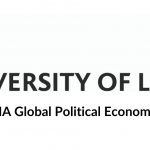Global Political Economy | University of Leeds
Our new programme situates the contemporary crises of capitalism (climate, health, food, and inequality) within mainstream and critical debates in global political economy. POLIS combines it regional expertise in African, American and European political economy with partner academics and practitioners to expose the challenges facing GPE today.
How does the programme provide content to ensure students achieve an understanding of a reasonably diverse set of perspectives on understanding economies?
The programme builds students skills and awareness in capturing and interpreting primary and secondary empirical data. In doing so we explore a wide range of theoretical frameworks for understanding political economy - from the everyday experience of environmental crisis to the political economy of health during pandemic times. The course develops students skills in traditional IPE debates around the state and capitalism while also enabling them to examine the makeup of global inequality in everyday lives.
How does the programme ensure students understand the interaction between economic and ecological systems?
Climate change is integrated into the two core modules. Our presentation of the canon of GPE is designed to highlight the conceptual gaps that have been revealed both through climate change activism and through the distribtution of risks from environmental change onto bodies and places that have been ignored in GPE. We examine key sectors in our second core module to offer detailed engagement with the powers structures that sustain inequality, privelege social forms and perpetuate unsustainable forms of economic behaviour.
How does the programme ensure students understand how to critically explore real-world evidence, both qualitative and quantitative?
Students will engage with real world problems throughout their programme. A series of dioscussions with practitioners operating from international to local levels will present students with the experience of real world problems. These practitioners will be invited to inform student assessment topics and, in one module, present practical problems for students to develop solutions for in interdisciplinary teams.
What pedagogical approaches does the programme use to ensure that students examine the historical context, assumptions and values in all economic thinking?
The University of Leeds invests heavily in teaching development and innovation. This has enabled us to explore a wide range of pedgogical approaches - deliberative, pragmatic, embodied - that bring students closer to the practice of economic analysis and problem solving. We explore legacies of slavery in the organisation of contemporary capitalism, the limitations of rational choice in healthcare decisions and the role of property rights in normalising behaviour in financial markets.
How does the department ensure that the teaching culture and capacity to deliver economic pluralism are continually improving?
POLIS, the host, has invested in a new Centre for Teaching Innovation and Scholarship whose director is on the GPE team. Students can draw on a wide range of regional and substantive expertise from the range of PG modules available to them from lead researchers in their fields. This range of approaches delivers a broader perspective to understanding economic pluralism that begins its understanding of the economy from differently situated perspecives, creates alternative conceptual frames and capures competing normative stances.
Country:
United Kingdom
University:
University of Leeds
Course name:
Global Political Economy
Department/school:
School of Politics and International Studies
Course level:
Taught Masters
Course language:
English

 all programmes
all programmes